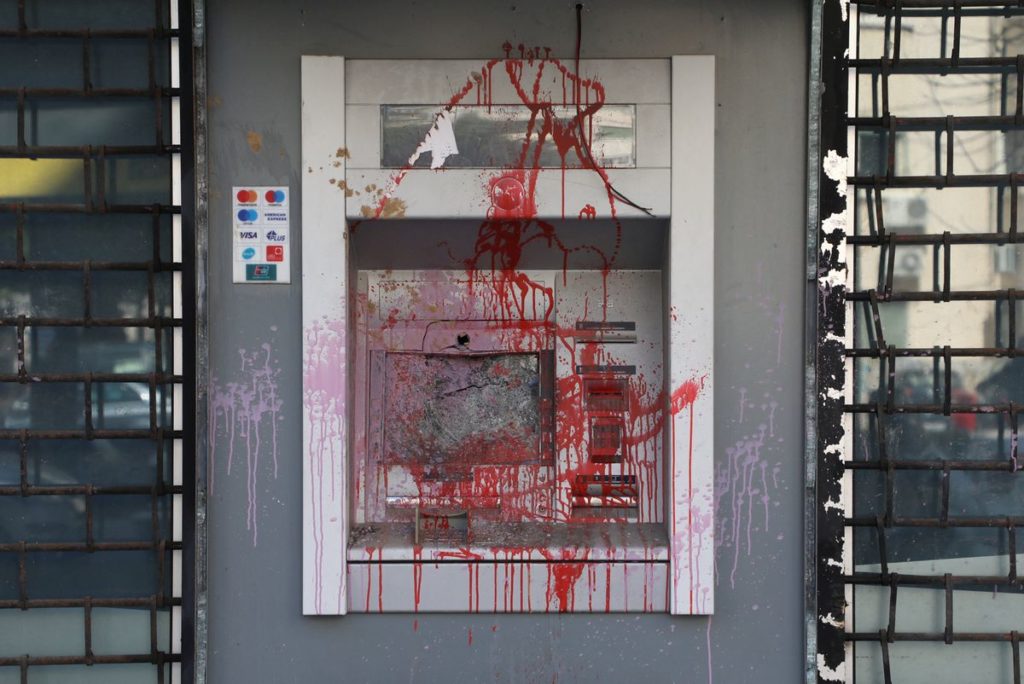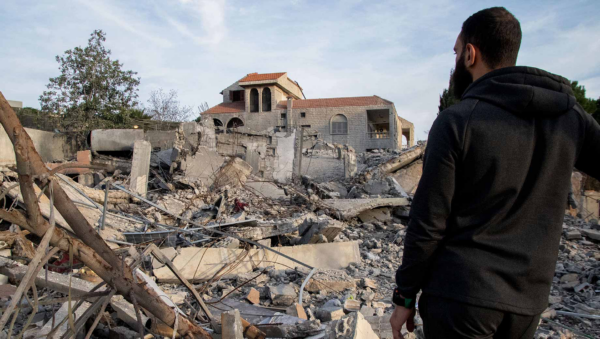The Israel-Hamas war sparked the south Lebanon exodus, as people fled border areas after Hezbollah launched attacks against Israel on October 8, 2023. This man returned to his village to find his house in ruins
WASHINGTON, D.C. — Gallup finished its surveys in Lebanon on Sept. 9 last year, less than a month before the Israel-Hamas conflict erupted. Since then, tensions and death tolls have risen along Lebanon’s border with Israel, where the militant group Hezbollah has a strong presence. On Monday, Israel killed a top Hezbollah commander in south Lebanon.
If the war between Israel and Hamas spills into Lebanon, it could further destabilize a country that Gallup surveys showed was still struggling — on multiple fronts — to emerge from years of crippling economic and political
crises.
1. Confidence in the financial system remains at rock bottom
After more than four years of a deep economic crisis, the confidence that Lebanese once had in their financial system is gone. A rare few — just 3% — express faith in their financial institutions or banks.
After the 1975-1990 civil war in Lebanon, successive administrations borrowed large sums of money to help rebuild the nation, accumulating significant national debt. Things came to a head when the government failed to deliver on 2018 election promises of structural reform and defaulted on its foreign debt in 2020.

Between 2018 and 2020, public faith in the financial system collapsed and has been in the single digits since 2021, including 3% in 2023. Since the Gallup World Poll began, Lebanon has recorded three of the five lowest scores ever for financial confidence, all since the global economic crisis.
Confidence in the national government is not much higher, at 9% in 2023. Perceptions of widespread government corruption have averaged 90% in Lebanon since 2006, tied with Nigeria (89%) for the highest levels in the world. More than three years have passed since the Beirut port explosion that decimated parts of the city, yet no one has been held accountable for it.
The institution that Lebanese have the most confidence in is their military (90%), far higher than either their government or financial system. After Lebanon’s economic meltdown, the U.S. and Qatar stepped in to pay Lebanese military salaries, helping to keep approximately 80,000 troops employed.
2. Majority finds things ‘very difficult’ on present income
Since 2019, the Lebanese pound has lost over 98% of its value against the dollar and has sunk to new lows as huge volumes of the currency have been pumped into the economy. The salaries of those still paid in pounds are now worth fractions of what they were a few years ago.
Household incomes took a big hit, and 64% of people now find that getting by on their present income is “very difficult.” This is on par with the past two years and among the highest percentages ever measured by the World Poll.
One respondent to the survey in Lebanon broke down in tears when asked for their opinions on their local area, saying they loved their town but could not afford to fix their poorly built house. This respondent couldn’t even afford fuel to return to their village, with a tank of gas costing nearly a third of their monthly salary of 65 USD.
3. Widespread inability to afford basic needs
The sharp devaluation of the Lebanese pound led to food price hikes, which shot up by almost 500% in January 2022. As the crisis deepened in 2019, 15% of adults had struggled to afford food at times in the previous year. The figure now stands at 43%.
The inability to afford food disproportionately affects the poorest income bracket: 78% of Lebanese in the poorest 20% income group struggled to afford food in 2023, compared with 15% in the richest 20%. This 63-percentage-point gap between the richest and poorest is also one of the widest ever measured by the World Poll.
4. Public services falter
The educational system in Lebanon has been hit hard by the economic crisis. Many public schools have closed for long periods, with teachers striking and resigning in protest over issues like crumbling infrastructure, leaving children to drop out of school permanently. Before the crash, satisfaction with the educational system had never fallen below the majority level. Even with a modest recovery since 2021, it remains relatively low at 46%.
Satisfaction with the availability of quality healthcare tells a similar story and now stands at 27% amid mass migration of medical staff and shortages of key supplies and medicine.
5. The worst place in the world to Look for work?
There is little comfort in the search for employment, with 13% of adults currently unemployed, rising to 26% among those aged 15 to 24. Just 4% thought it was a good time to find a job in 2023.
In 2022, Lebanon (4%) tied Afghanistan (6%) as the most pessimistic country in the world about the job market. Both countries scored equally poorly in 2023.
6. Most believe the economy will get worse before it gets better
The economic circumstances of the past four years translate into a gloomy outlook on the trajectory of the economy and living standards. Only 4% thought their local economy was getting better in 2023, and 7% felt the same about their living standards.
7. Some fragile shoots of optimism?
Yet, even amid such deep economic and social suffering, some hope is starting to emerge. When asked to rate how they think their lives will be in five years, people were more optimistic in 2023 than at any time since the crisis began.
Some Lebanon analysts have argued that the 2022 elections — in which 13 independent members of Parliament, dubbed the “change opposition,” won seats — was a source of cautious optimism.
But in a wider context, Lebanon is more pessimistic about the future than the rest of the world, except for Afghanistan. In a country that has experienced several shocks in recent years, hope is still in short supply.
Bottom Line

Lebanon was already in a fragile state before Oct. 7. While Lebanese continue to express confidence in their military, unlike all other state institutions, this does not guarantee the country would cope well with a conflict with Israel: Such a war would likely be primarily fought between Hezbollah and the Israeli military, not the Lebanese armed forces.
The economic crisis has led to a rising inability to afford basic needs, with public services such as healthcare and education continuing to falter. Being dragged into the war currently unfolding between Israel and Hamas would likely spiral the already vulnerable nation and state institutions into further disarray. The prospect of yet more instability is unlikely to improve the lives of Lebanon’s 5.4 million people.
GALLUP


Leave a Reply
You must be logged in to post a comment.